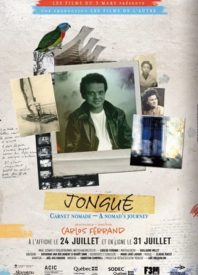
Place and identity are important concepts for Serge Emmanuel Jongue. And those concepts have their complexities since he was a Frenchman who has a Guyanese father and a Polish mother. Both parents have their own ancestries and stories that official records don’t tell. Carlos Ferrand’s Jongue: A Nomad’s Journey takes interest on where its main subject comes from. Because that complex story dictates the person he ends up becoming.
Jongue is a documentary showing the emotional depth of a person behind dry historical records. Accompanying many images of those records is Christian Campbell’s English narration. That voice is present when a biracial boy grows up in postwar France. And it’s still there as he immigrates to Quebec and starts a long career as a press photographer. His past seeps into his work as he documents the lives of immigrants in the French speaking world.
These Quebecois immigrants have their own rich history that deserve visual record. But words, to Jongue, are as important as images. And this movie gives us access to both his pictures and his notes. By recording an English version of the narration, the film gives Anglophones access to this man. But I can only imagine how a Francophone would see these notes. They can probably pick up the information on those notes faster than an Anglophone like me. I can only appreciate his good handwriting.
The movie also goes to Jongue’s parents’ homelands, Guyana, showing both its natural beauty and its unique infrastructure. Most films that return to their subjects’ homelands tackle a disconnect that comes with the idea of place. One exists within one’s memory or imagination, different from present day realities. The doc takes a different approach in engaging with both past and present. He, along with us, looks for markers of the people who shares the same spaces he visits.
Sometimes the writing and the images go together. His notes expressed frustration at the way people from his two ethnic groups thought. But that frustration, surprisingly enough, comes with a maturity. It came at a time in his life where he can celebrate, through visual form, his complex heritage. Some of his work include self portraits, where expressions are subtle, where people and place meet again.
Depicting his work sometimes makes those objects come to life. The aesthetic here sometimes feels like a multidimensional elegy, Rauschenberg style. Jongue worked with different mediums, sometimes with Polaroids. And the doc accompanies that display of his work with sounds of traffic, as if saying that time passes. It’s a painful truth in remembering an artist who deserved a bigger spotlight.
Jongue: A Nomad’s Journey begins a short theatrical run in Quebec before temporarily going on demand.
- Release Date: 7/28/2020

